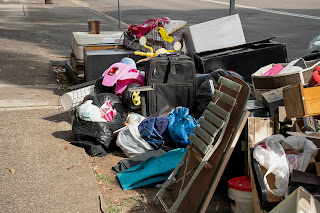A Guide to Sustainable Household Waste Disposal
This comprehensive guide aims to empower individuals and families with the knowledge and practices needed for sustainable household waste disposal. From reducing overall waste generation to implementing effective recycling strategies, this guide covers a spectrum of eco-friendly practices that contribute to a healthier planet and community.
1) Understanding Household Waste-
Before embarking on a sustainable waste disposal journey, it's essential to comprehend the types and sources of household waste for waste management company Dubai. This section delineates the various categories of waste, from recyclables and organics to hazardous materials, shedding light on the environmental impact of each. Understanding the life cycle of waste materials forms the foundation for adopting responsible disposal methods.
2) Reduce, Reuse, Recycle-
The mantra of "Reduce, Reuse, and Recycle" forms the cornerstone of sustainable waste management. This section provides practical tips and strategies for minimizing waste at its source, encouraging conscious consumer choices, and fostering a culture of reuse. Additionally, it delves into the importance of recycling, detailing the process and benefits while offering insights into establishing effective recycling routines at home.
 |
Subsection 2.1: Minimizing Single-Use Plastics Highlighting the detrimental impact of single-use plastics on the environment, this subsection offers alternatives and strategies for reducing plastic consumption. Practical tips for adopting a plastic-free lifestyle and making eco-conscious choices in daily routines are explored by waste disposal services in UAE.
Subsection 2.2: Embracing the Circular Economy Introducing the concept of a circular economy, this subsection emphasizes the importance of designing products with recycling in mind. It explores how individuals can support a circular economy by choosing products with sustainable packaging, extending the life of items through repairs, and participating in local take-back or recycling programs.
3) Responsible Disposal Practices-
Efficient waste disposal involves adopting responsible practices to ensure that waste is managed in an environmentally friendly manner. This section outlines proper disposal methods for different types of waste, including household chemicals, electronic waste, and bulky items.
Subsection 3.1: Hazardous Waste Management addressing the challenges posed by hazardous household waste, this subsection provides guidelines for the safe disposal of items such as batteries, cleaning products, and light bulbs. It emphasizes the significance of proper disposal to prevent environmental contamination according to waste collection services Dubai.
Subsection 3.2: Electronic Waste (E-Waste) Recycling As electronic devices become an integral part of daily life, the proper disposal of e-waste is paramount. This subsection explores the environmental impact of electronic waste and outlines methods for recycling or donating old electronic devices.
Subsection 3.3: Bulky Item Disposal Managing large or bulky items present unique challenges. This subsection offers insights into responsible disposal options, including donation, recycling centers, or scheduling bulk waste pickups provided by local waste management services of electronic waste recycling Dubai.
4) Composting and Organic Waste Management-
A significant portion of household waste comprises organic materials that can be repurposed through composting. This section provides an in-depth look at composting methods, detailing the benefits of compost and offering practical tips for incorporating composting into daily life.
Subsection 4.1: Backyard composting for those with outdoor spaces, backyard composting is a viable option. This subsection outlines the essentials of setting up and maintaining a backyard composting system, turning kitchen scraps and yard waste into nutrient-rich compost for gardens.
Subsection 4.2: Indoor Composting Solutions For urban dwellers or those without outdoor space, indoor composting solutions are explored by household waste disposal in Dubai. This includes vermicomposting (using worms) and bokashi composting, allowing individuals to compost kitchen waste effectively within limited spaces.
5) Community Engagement and Outreach-
Sustainable waste management extends beyond individual households. This section encourages community engagement and outreach initiatives to raise awareness, promote responsible waste disposal practices, and foster a sense of collective responsibility.
Subsection 5.1: Neighborhood Clean-Up Campaigns Organizing and participating in neighborhood clean-up campaigns can strengthen community bonds while addressing local waste challenges. This subsection offers guidance on planning and executing successful clean-up events, emphasizing the positive impact of collective efforts.
Subsection 5.2: Educational Workshops and Programs Promoting sustainable waste practices through educational workshops and programs is key to building awareness. This subsection explores the development and implementation of educational initiatives, both within local communities and in collaboration with schools and institutions.
Comments
Post a Comment